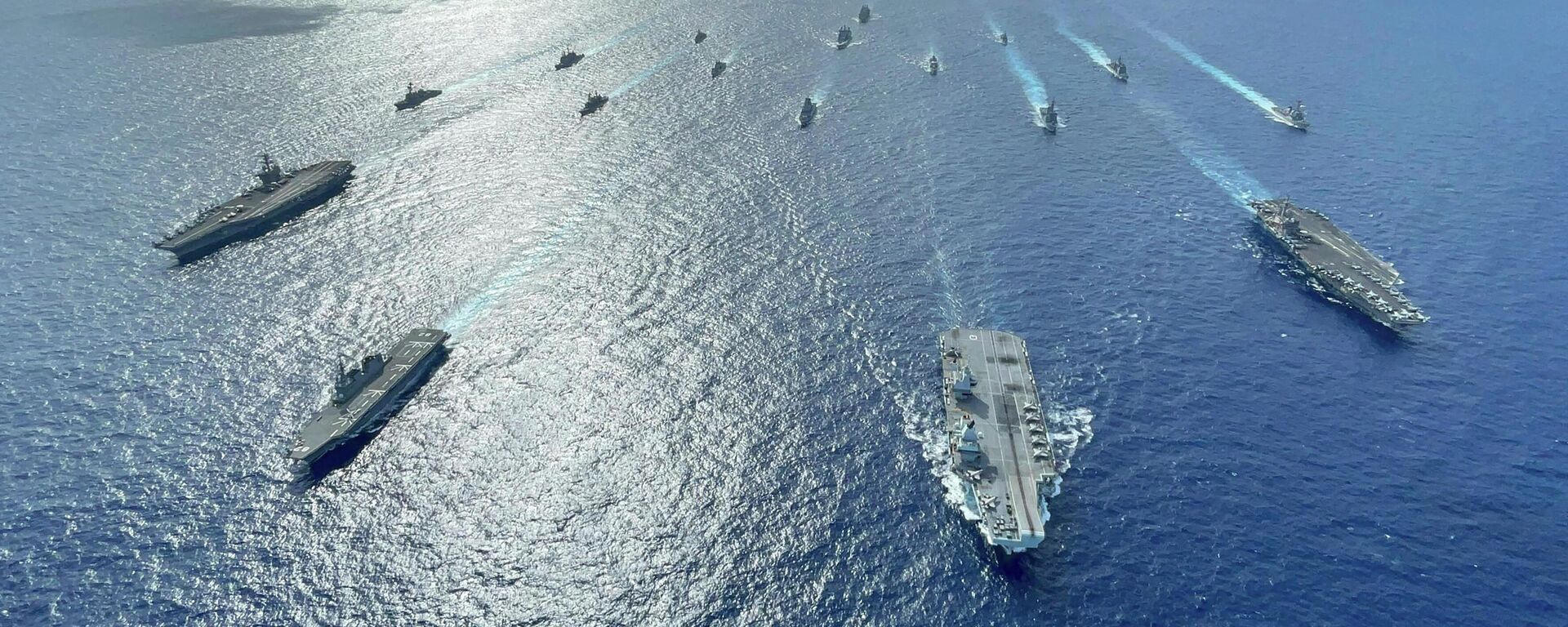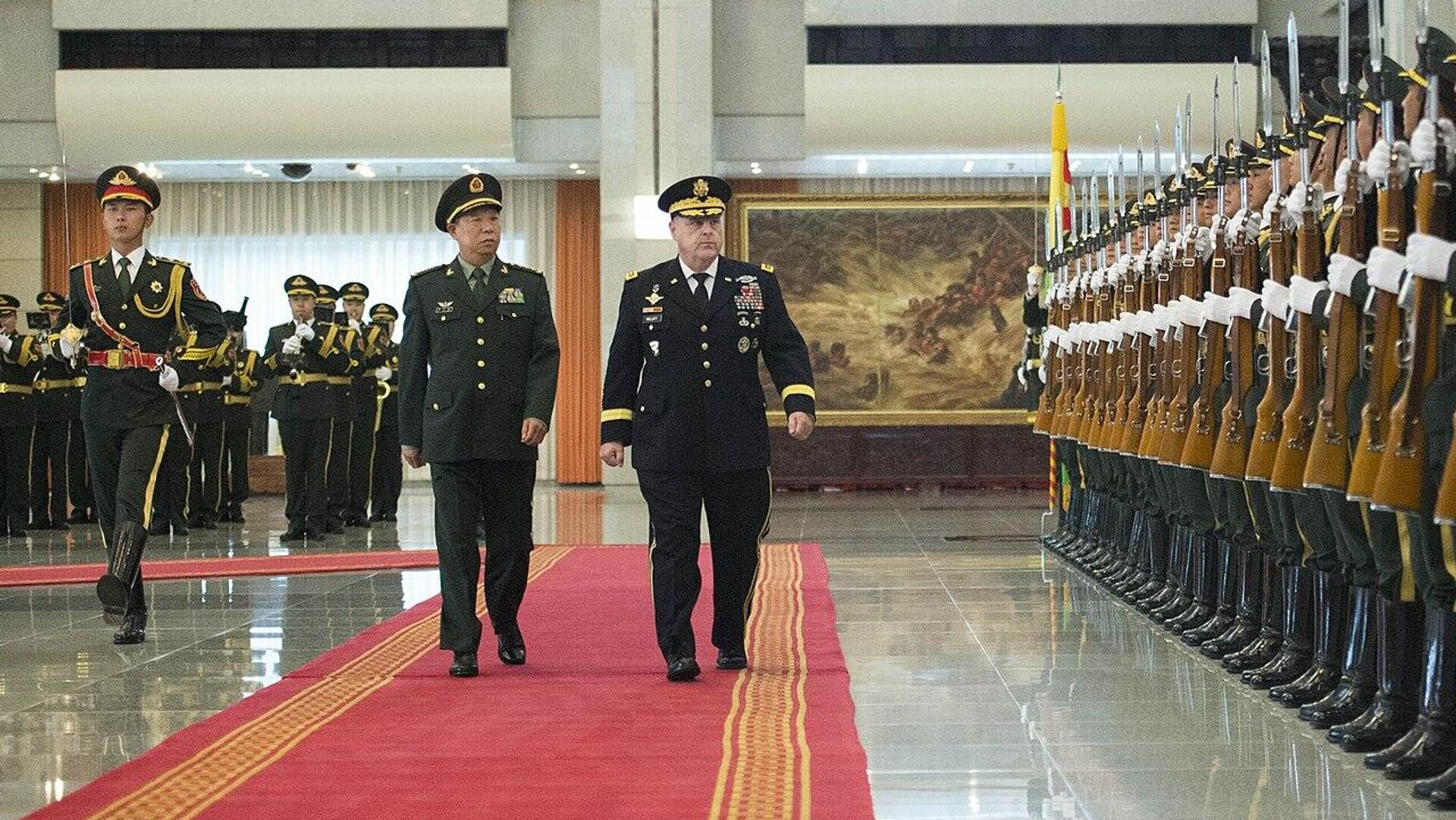https://sputnikglobe.com/20230629/sanctions-obstruct-china-us-military-communication---diplomat-1111543907.html
Sanctions Obstruct China-US Military Communication - Diplomat
Sanctions Obstruct China-US Military Communication - Diplomat
Sputnik International
Amid strained US-China relations, a Chinese diplomat has urged the Biden administration to lift sanctions against China as a proviso for facilitating high-level military communication between the two nations.
2023-06-29T13:20+0000
2023-06-29T13:20+0000
2025-04-07T11:07+0000
world
joe biden
antony blinken
wenjian liu
washington
beijing
china
chinese embassy
pentagon
state department
https://cdn1.img.sputnikglobe.com/img/07e5/09/1c/1089477191_0:74:1280:795_1920x0_80_0_0_e25fa12aa5d8c4f8963c48ef05e37fa2.jpg
The current situation faced by the US Joe Biden administration demonstrates the unexpected repercussions of sanctions used to express dissatisfaction or influence other countries' actions. This highlights Beijing's unease in a recent statement from the Chinese Embassy in Washington, DC, through its spokesperson, Liu Pengyu, accusing the US’ sanctions policy of playing role in their strained military relationship, thereby underscoring the need for Washington to remove the restrictive measures.Liu Pengyu also called for removing obstacles to negotiations and negatively assessed the dispatch of American warships and aircraft to areas located near China.The diplomatic relationship between the United States and China hangs precariously, teetering between normalization and conflicting actions. While formal dialogues hint at reconciliation, ongoing economic pressures persist, including the Trump-era tariff hike on Chinese goods, and the US spearheading joint efforts of the G7 countries at the Hiroshima Summit to impose investment and trade restrictions on China. These maneuvers serve as tactical attempts to gain strategic leverage, while also extending the olive branch of diplomacy.Also, the issue of US policy on Taiwan relations adds contention in the face of Beijing's adherence to the “One-China principle." Furthermore, the increased US military drills in the Asia-Pacific region with Indonesia and South Korea further strain Washington's relationship with China.The Biden administration has expressed its intent to improve relations with China, a commitment emphasized by Secretary of State Antony Blinken's recent diplomatic visit to Beijing. However, skepticism has arisen in light of the complex backdrop against which such gestures occur. For instance, President Biden labeling Chinese President Xi Jinping as a "dictator" appears inconsistent with the pursuit of reconciliation.The US diplomatic ballet combines gestures of peace with undercurrents of assertiveness. While this contradiction may serve US interests, it underscores the fragile nature of US-China ties. As these global superpowers navigate their intricate diplomatic tango, the discrepancy between rhetoric and action becomes increasingly apparent.
https://sputnikglobe.com/20230201/beijing-says-aukus-fuels-arms-race-in-asia-pacific-undermines-nuclear-non-proliferation-1106883565.html
washington
beijing
china
taiwan
Sputnik International
feedback@sputniknews.com
+74956456601
MIA „Rossiya Segodnya“
2023
Chimauchem Nwosu
https://cdn1.img.sputnikglobe.com/img/07e7/09/01/1113046371_0:99:1536:1635_100x100_80_0_0_9c5c627283eca931c39fe4852bbb301c.jpg
Chimauchem Nwosu
https://cdn1.img.sputnikglobe.com/img/07e7/09/01/1113046371_0:99:1536:1635_100x100_80_0_0_9c5c627283eca931c39fe4852bbb301c.jpg
News
en_EN
Sputnik International
feedback@sputniknews.com
+74956456601
MIA „Rossiya Segodnya“
Sputnik International
feedback@sputniknews.com
+74956456601
MIA „Rossiya Segodnya“
Chimauchem Nwosu
https://cdn1.img.sputnikglobe.com/img/07e7/09/01/1113046371_0:99:1536:1635_100x100_80_0_0_9c5c627283eca931c39fe4852bbb301c.jpg
us-china relations, biden administration, sanctions against china, high-level military communication, chinese embassy in washington d.c., liu pengyu, chinese defense minister li shangfu, us defense secretary lloyd austin, beijing, house speaker nancy pelosi, pentagon, security conference in singapore, china, biden leadership, us sanctions, state department spokesperson matthew miller, secretary of state antony blinken, asian pacific, us military presence near china's borders, freedom of navigation, christopher johnson, senior fellow on chinese politics at the asia society policy institute's center for china analysis.
us-china relations, biden administration, sanctions against china, high-level military communication, chinese embassy in washington d.c., liu pengyu, chinese defense minister li shangfu, us defense secretary lloyd austin, beijing, house speaker nancy pelosi, pentagon, security conference in singapore, china, biden leadership, us sanctions, state department spokesperson matthew miller, secretary of state antony blinken, asian pacific, us military presence near china's borders, freedom of navigation, christopher johnson, senior fellow on chinese politics at the asia society policy institute's center for china analysis.
Sanctions Obstruct China-US Military Communication - Diplomat
13:20 GMT 29.06.2023 (Updated: 11:07 GMT 07.04.2025) US Secretary of State Antony Blinken, following his visit to Beijing, said military cooperation dialogue is "work in progress" as the United States and China have not agreed to resume military-to-military communication amid rising tensions in the bilateral relationship.
The current
situation faced by the US Joe Biden administration demonstrates the unexpected repercussions of sanctions used to express dissatisfaction or influence other countries' actions. This highlights Beijing's unease in a recent statement from the Chinese Embassy in Washington, DC, through its spokesperson, Liu Pengyu, accusing the US’ sanctions policy of playing role in their strained military relationship, thereby underscoring the need for Washington to remove the restrictive measures.
“The US side knows the reason for difficulties in its military-to-military relations with China — it actually imposed unilateral sanctions on China,” Liu expressed.
Liu Pengyu also called for removing obstacles to negotiations and negatively assessed the dispatch of American warships and aircraft to areas located near China.
The diplomatic relationship between the United States and China hangs precariously, teetering between normalization and conflicting actions. While formal dialogues hint at reconciliation, ongoing economic pressures persist, including the
Trump-era tariff hike on Chinese goods, and the US spearheading joint efforts of the
G7 countries at the Hiroshima Summit to impose investment and trade restrictions on China. These maneuvers serve as tactical attempts to gain strategic leverage, while also extending the olive branch of diplomacy.
Also, the issue of US
policy on Taiwan relations adds contention in the face of Beijing's adherence to the “
One-China principle." Furthermore, the
increased US military drills in the Asia-Pacific region with Indonesia and South Korea further strain Washington's relationship with China.

1 February 2023, 12:16 GMT
The Biden administration has expressed its intent to improve relations with China, a commitment emphasized by Secretary of State Antony Blinken's recent diplomatic visit to Beijing. However, skepticism has arisen in light of the complex backdrop against which such gestures occur. For instance, President Biden labeling Chinese President
Xi Jinping as a "dictator" appears inconsistent with the pursuit of reconciliation.
The US diplomatic ballet combines gestures of peace with undercurrents of assertiveness. While this contradiction may serve US interests, it underscores the fragile nature of
US-China ties. As these global superpowers navigate their intricate diplomatic tango, the discrepancy between rhetoric and action becomes increasingly apparent.




